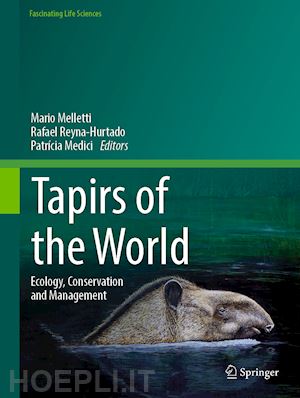
Questo prodotto usufruisce delle SPEDIZIONI GRATIS
selezionando l'opzione Corriere Veloce in fase di ordine.
Pagabile anche con Carta della cultura giovani e del merito, 18App Bonus Cultura e Carta del Docente
This beautifully illustrated book is the first comprehensive work ever published on all four tapir species worldwide, filling a gap in the scientific literature. The book provides information on the systematics, phylogeny, evolution, ecology, conservation, and management of all tapir species.
This volume is aimed at a wide range of readers, including researchers, wildlife managers, zoologists, conservation biologists, ecologists, veterinarians, zoo staff, students and environmental policy makers.
Part I. Systematics and Evolution.- Chapter 1. Evolution, Biogeography and Genetics of Living Tapirs.- Chapter 2. The Fossil Record of Tapirs.- Part II. Species Accounts.- Chapter 3. Lowland Tapir Tapirus Terrestris (Linnaeus, 1758).- Chapter 4. Baird’s Tapir Tapirus bairdii (Gill, 1865).- Chapter 5. Mountain Tapir Tapirus pinchaque (Roulin, 1829).- Chapter 6. Malayan Tapir Tapirus indicus (Desmarest, 1819).- Part III. Conservation and Management.- Chapter 7. Tapir Red Listing, Conservation Strategies, and Action Planning.- Chapter 8. The Effects of Hunting on Tapir Populations.- Chapter 9. Human-Tapir Coexistence: How to Manage Human Tapir Conflicts in Less Developed Countries.- Chapter 10. The Impact of Roads And Traffic on Tapir Species.- Chapter 11. Tapir Health.- Chapter 12. Translocations and Reintroductions of Tapirs: Case Studies.- Chapter 13. The Importance of Tapirs as Gardeners of the Forest, Umbrella Species and Landscape Architects.- Chapter 14. Conservation of Tapirs in Zoological Parks: Roles; Status and Management.
Mario Melletti is an Italian freelance wildlife biologist and a member of the African Buffalo Initiative Group and the Wild Pig Specialist Group, both of the IUCN SSC. During his Ph.D. and M.Sc. studies, he was affiliated with the Department of Animal and Human Biology, University of Rome "La Sapienza", Italy, and the Department of Conservation Biology, Estación Biólogica de Doñana (CSIC-EBD), Seville, Spain. For about 3 years he has been studying the ecology and behavior of the forest buffalo in Central Africa. Mario has conducted research on other large mammals and has participated in some projects and surveys on large mammals in several African countries. In 2010, he began editing books on mammalian biology, conservation, and management. He has edited a total of seven books and about 70 scientific publications.
Rafael Reyna-Hurtado is a Mexican biologist who has been studying tropical ungulates in Mesoamerica since 1997. Rafael received his M.S. and Ph.D. degrees in Wildlife Ecology and Conservation from the University of Florida, USA. He also conducted a three-year postdoctoral study at McGill University, Montreal, Canada, focusing on East African terrestrial forest mammals. Rafael's research has focused on the movement ecology of social species, particularly the white-lipped peccary in the Calakmul forest of Mexico and the giant forest hog in Kibale National Park, Uganda. Rafael is a professor at El Colegio de la Frontera Sur in the city of Campeche, southern Mexico, where he has formed a team of highly qualified students who are conducting studies on the movement patterns of tropical ungulates throughout Mesoamerica. Rafael has published more than 100 scientific journal articles and book chapters, 20 of which focus on the ecological or population aspects of the Baird's tapir.
Patrícia Medici is a Brazilian conservationist whose main professional interests are tapir conservation, tropical forest conservation, landscape ecology, and communication. Patrícia has a Bachelor's Degree in Forestry Sciences from the São Paulo University (USP - Universidade de São Paulo), a Master's Degree in Wildlife Ecology, Conservation and Management from the Federal University of Minas Gerais (UFMG - Universidade Federal de Minas Gerais), Brazil, and a Ph.D. Degree in Biodiversity Management from the Durrell Institute of Conservation and Ecology (DICE), University of Kent, United Kingdom. For over three decades, Patrícia has been working for a Brazilian non-governmental organization called IPÊ - Instituto de Pesquisas Ecológicas (Institute for Ecological Research) of which she was one of the founding members in 1992. Since 1996, Patrícia coordinates the Lowland Tapir Conservation Initiative (LTCI) and dedicates her life to the conservation of tapirs and their remaining habitats in Brazil. Since 2000, Patrícia has been the Chairperson of the IUCN SSC Tapir Specialist Group (TSG), a network of over 100 tapir conservationists from 25 different countries worldwide. Patrícia is a TED Fellow since 2014 and a National Geographic Explorer since 2019. She has been honored with several prestigious conservation awards: Harry Messel Conservation Leadership Award from the International Union for Conservation of Nature (2004); Future for Nature Award from the Future for Nature Foundation in the Netherlands (2008); Whitley Award from the Whitley Fund for Nature in the United Kingdom (2008); Columbus Zoo Commitment to Conservation Award (2017); William G. Conway International Conservation Award - Significant Achievement (2018); National Geographic Society / Buffett Award for Leadership in Conservation (2019); Whitley Gold Award from the Whitley Fund for Nature in the United Kingdom (2020); and, WINGS Women of Discovery Award (2024).











Il sito utilizza cookie ed altri strumenti di tracciamento che raccolgono informazioni dal dispositivo dell’utente. Oltre ai cookie tecnici ed analitici aggregati, strettamente necessari per il funzionamento di questo sito web, previo consenso dell’utente possono essere installati cookie di profilazione e marketing e cookie dei social media. Cliccando su “Accetto tutti i cookie” saranno attivate tutte le categorie di cookie. Per accettare solo deterninate categorie di cookie, cliccare invece su “Impostazioni cookie”. Chiudendo il banner o continuando a navigare saranno installati solo cookie tecnici. Per maggiori dettagli, consultare la Cookie Policy.